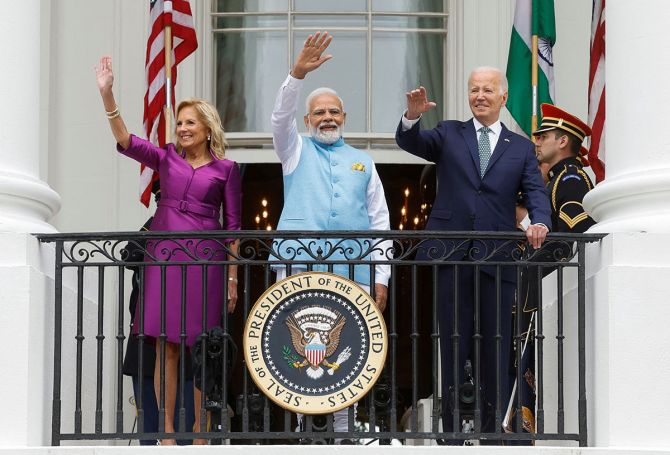'US officials must grapple with the possibility that one of its closest partners attempted an extrajudicial killing on its soil.'
'This is not something that friends typically do to friends.'

"The Biden administration has been quietly concerned about the BJP government's increasingly repressive policies at home. But those policies being implemented hundreds of miles away didn't directly impact the US or its interests. And yet now, if the allegations in the indictment are true, those policies have literally come to America," says Dr Michael Kugelman, Director, South Asia Institute, the Wilson Centre in Washington DC.
Dr Kugelman is a leading specialist on Afghanistan, India, and Pakistan and their relations with the United States.
"The biggest takeaway here is something that many analysts of US-India relations, myself included, have argued for quite some time: The US-India relationship works best if it is pursued through the lens of interests, not values," he tells Rediff.com's Archana Masih in an e-mail interview about the indictment of an Indian man in the foiled assassination attempt of Sikh separatist Gurpatwant Singh Pannun in the United States.
The general sense in India is that the revelation of the indictment in the United States will not have much of an impact on India-US relations because there has been no upheaval in diplomatic relations since the US first raised this matter in August.
Do you believe it will be business as usual because the India-US partnership is too important to be derailed by these charges?
It's true that the relationship is too big to fail. There are too many strategic imperatives at stake to risk a rupture, or even serious damage, to a partnership that has experienced exponential growth for more than two decades.
But this doesn't mean the relationship hasn't sustained any damage. It has, albeit in ways that won't be in the public eye.
Let me explain. It's true that this crisis has been handled calmly and diplomatically. We're not seeing the angry public rhetoric that accompanied the India-Canada crisis.
But despite all that, US officials must grapple with the possibility that one of its closest partners attempted an extrajudicial killing on its soil. This is not something that friends typically do to friends.
It would be overkill to describe this as a betrayal of trust. But for a relationship that has built up so much trust over more than 20 years, it's a shock to the system.
Will this lead to the Americans exercising caution in their dealings with the Indian government?
Does it have the potential to slow down the pace of the India-US relationship which has been on an upswing? How will this impact the relationship?
The Biden administration has received a bit of a wake up call.
For several years, it has been quietly concerned about the BJP government's increasingly repressive policies at home. But those policies being implemented hundreds of miles away didn't directly impact the US or its interests. And yet now, if the allegations in the indictment are true, those policies have literally come to America.
The biggest takeaway here is something that many analysts of US-India relations, myself included, have argued for quite some time: The US-India relationship works best if it is pursued through the lens of interests, not values.
All that public messaging about the world's oldest and largest democracies working together may have exceeded its shelf life.

Indian diplomacy has always taken the noble and moral high ground in the international sphere -- therefore, is this charge of planning an assassination bid an aberration?
Does this also indicate that Indian statecraft has changed from the past, that India has become far more assertive and self-assured about its place in the world and therefore has the wherewithal to withstand and counter the fallout of these allegations?
There's good reason to believe India has carried out extrajudicial killings in a few countries in its neighborhood, especially Pakistan. But State-sponsored operations in Canada and the US, or anywhere in the West, would represent uncharted territory.
Such operations are much riskier for operational and diplomatic reasons. It's true that the Modi government seeks to project strength, and to convey the impression that it will take whatever steps necessary to weed out serious threats to the State.
However, how that plays out with the current situation remains unclear, as we don't yet know if we're talking about an assassination attempt endorsed at the highest levels of governments, or if this was a rogue actor within the State operating independently.
There's also the issue of threat perceptions. In the view of the Indian government, we are seeing rising levels of Khalistan activism in the West that may reflect the comeback of a movement that India essentially eliminated several decades ago.
Based on that argument, New Delhi may be responding to a growing threat, using all necessary means, that it believes is not being addressed by the countries from which the threat emanates the most.
I do think that New Delhi recognises that the reputation that India has earned globally -- a strategic partner, a critical market, an economic powerhouse -- gives India a form of impunity that results in most of the world treating its more problematic policies with kid gloves.
In effect, it gets free passes, and it leverages that.
However, does this charge have the potential to damage India's credentials as a mature, responsible, rules-based democracy that has been carefully built over the decades?
Or will realpolitik take precedence and surmount this temporary roadblock?
There's a very telling data point -- one that emerged just days after US officials unsealed the indictment -- that suggests India's stature in the world will remain strong.
Narendra Modi arrived in Qatar for COP28, and he was warmly welcomed and embraced by world leaders from around the globe.
I'm unaware of any leaders -- at least those that considered India a friend before the US allegations -- snubbing or distancing themselves from Modi.
There have been so many times in recent years when there is a 'now things will change' moment, when India's government has taken actions that prompt observers to think the world will start looking at in a different way.
The revocation of Jammu and Kashmir's autonomy, hate speech uttered by several BJP leaders, revelations of attempts to strongarm foreign tech firms, and most recently the Canadian allegations: In all these cases, there have been questions about whether global perceptions would shift. But it hasn't happened, due to the same strategic and commercial factors I mentioned earlier.

Why has India's response to America been different from Canada? Diplomatic relations hit an all-time low with Canada when it alleged India's role in the Nijjar killing, but the response to America has been rather muted.
What do you see as the reasons for this?
There are three core reasons why India's response has been so different: Messaging, evidence, and partnership.
Canada went public with its allegations; the US took them up privately. Canada's allegations contained little evidence; the US unsealed an indictment full of evidence. And Canada's relationship with India -- while generally cordial and productive -- is nowhere near as strong, stable, and trust-based as is the US relationship with India.
How is this likely to impact other countries that are dealing with India or are courting India?
Every country is different. Some will be less bothered by the allegations than others. I doubt that those countries, especially authoritarian States, that carry out the same types of operations that India has been accused of carrying out will be that troubled.
But for the Western democracies that enjoy close relations with India and project themselves -- rightly or wrongly -- as proponents of a rules-based order will certainly feel some unease.
This won't stop them from pursuing and indeed increasing partnership with India, but that sentiment will linger, in ways that aren't healthy for trust-based relationships.
Feature Presentation: Aslam Hunani/Rediff.com









